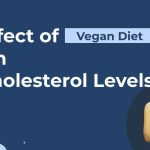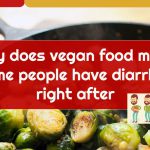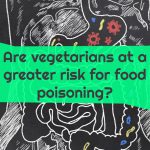What Is the Relation Between Veganism and Depression?
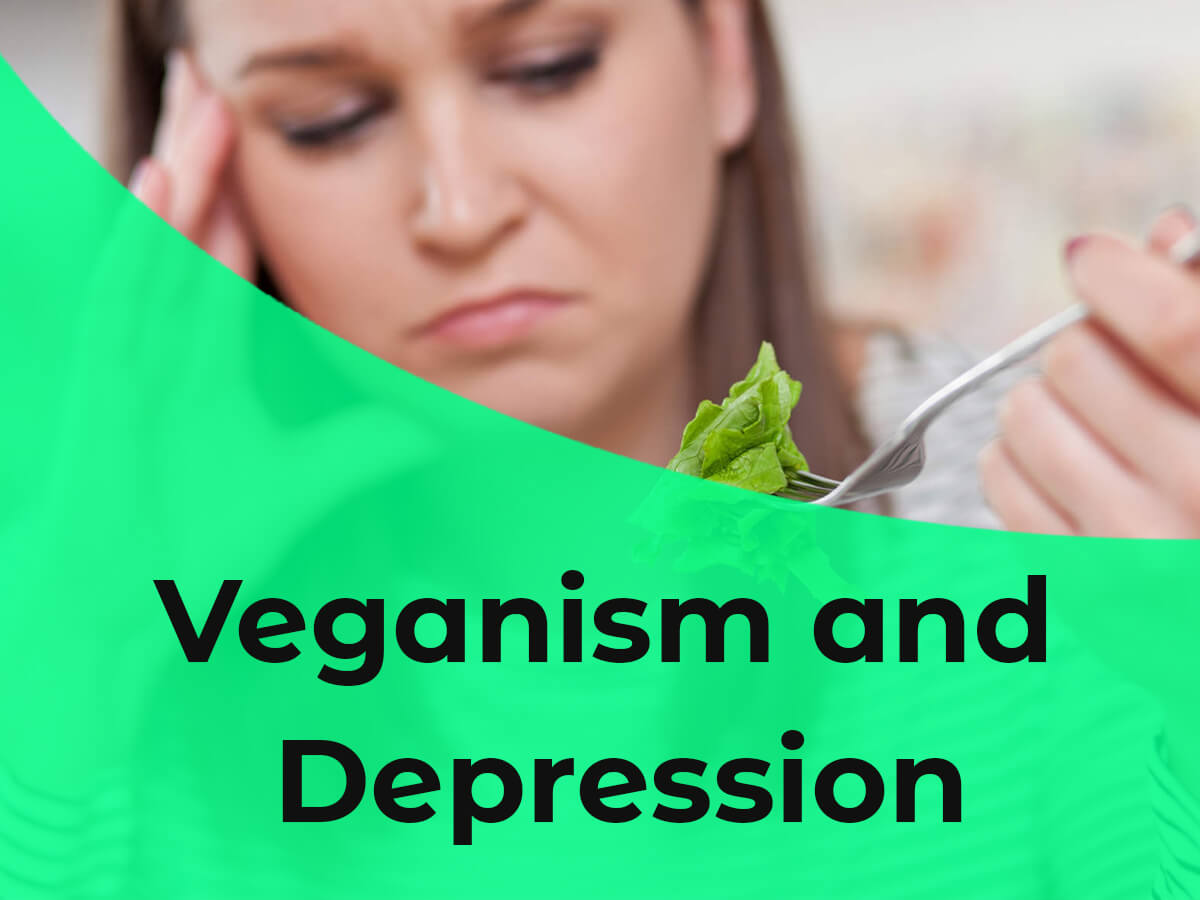
Hey there! Have you ever wondered if what you eat can impact your mental well-being? Well, the answer is a resounding YES!
In this essay, I’ll explore the Relation between veganism and depression, drawing on personal experience and scientific research.
We’ll discover how adopting a vegan lifestyle can benefit our furry friends and the environment and work wonders for our mental health and mood. So, let’s get started on this exciting adventure!
In this article you will read:
The link between nutrition & mental health
Depression isn’t just feeling blue; it’s a serious condition affecting millions worldwide.
As someone who’s struggled with depression and anxiety in the past, I know firsthand how much my diet affects my mood and well-being.
And it turns out that there’s much scientific evidence to support the connection between veganism and depression.
Studies have shown that certain nutrients, such as omega-3 fatty acids, B vitamins, and zinc, play a crucial role in maintaining good mental health.
For example, low levels of omega-3s have been linked to an increased risk of depression. At the same time, B vitamins are important for neurotransmitter production and can help alleviate symptoms of anxiety.
Discover the Key Vitamins for Mental Well-being
Vitamin B12
One of the key nutrients that we vegans focus on is vitamin B12. This vitamin plays an essential role in the functioning of our nervous system and is crucial for the production of serotonin, the “feel-good” hormone. Without adequate levels of B12, we can experience symptoms like fatigue, brain fog, and even depression. While many animal products are rich in B12, there are plenty of vegan-friendly sources, like fortified plant-based milks, nutritional yeast, and supplements.
What Foods Are High in B12 Vitamin For Vegetarians and Vegans
Vitamin D
Another vitamin that is important for mental health is vitamin D. This nutrient is essential for regulating mood and can help to prevent seasonal affective disorder (SAD), a form of depression that often occurs during the winter months. While our bodies can produce vitamin D when exposed to sunlight, it can be challenging to get enough of it through diet alone. Some vegan-friendly sources of vitamin D include fortified plant-based milks, mushrooms, and supplements.
What Vegetarian Foods Are High in Vitamin D
Omega-3 fatty acids
Omega-3 fatty acids are another nutrient that has been linked to improved mental health. These healthy fats can help to reduce inflammation and promote healthy brain function, making them a natural anti-depressant. While many people associate omega-3s with fish, there are plenty of vegan sources, like chia seeds, flaxseeds, and hemp seeds.
It’s important to be mindful of your nutrient intake and ensure you get enough of the vitamins and minerals your brain needs to function properly.
Foods High in Omega 3 for Vegetarians and Vegans
But it’s not just about individual nutrients – overall dietary patterns also matter.
A diet high in processed foods and added sugars has been linked to an increased risk of depression. In contrast, a diet rich in whole foods, fruits, vegetables, and legumes (like a veganism diet) is linked to decreased levels of anxiety and depression.
Of course, nutrition is just one piece of the puzzle regarding mental health. Many other factors are at play, like genetics, stress, and trauma.But by nourishing our bodies with wholesome, nutrient-dense foods, we can give ourselves the best possible chance of feeling our best mentally and emotionally.
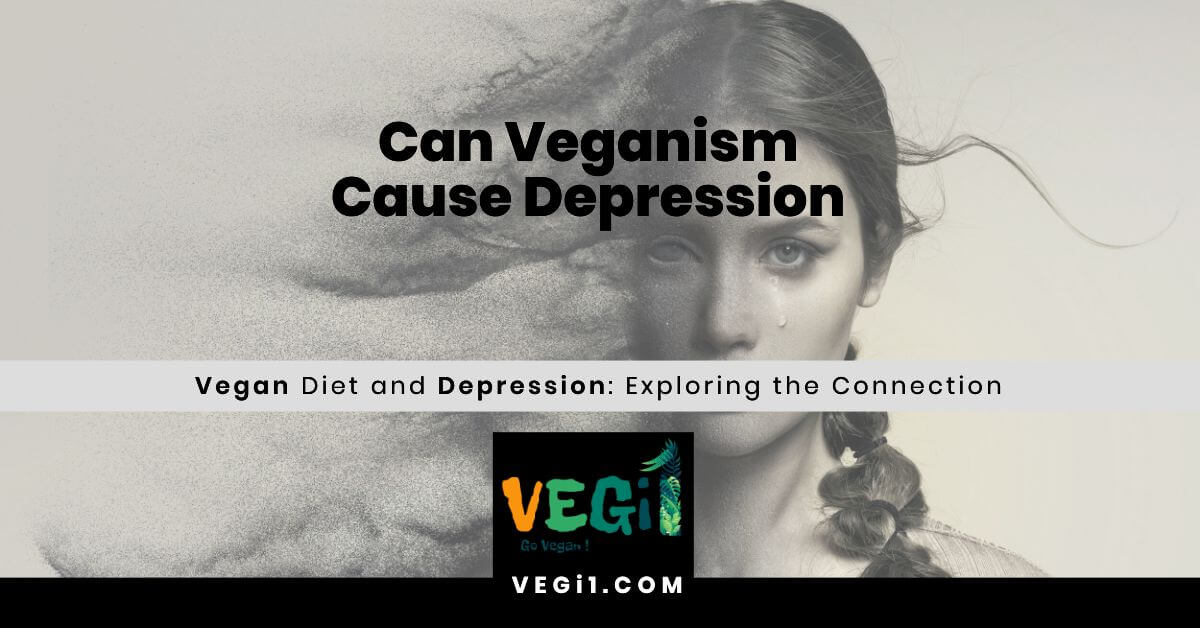
The Negative Effects of Meat Consumption on Mental Health: Unveiling the Truth
Let’s dig deep into the relationship between meat consumption and our mental well-being. It’s crucial to shed light on the negative effects that meat-based diets can have on our mental health. So, buckle up, and let’s explore why ditching meat might be the key to a happier mind.
-
Inflammation and Oxidative Stress:
When we consume animal products, we’re not just ingesting their nutrients. We’re also taking in harmful substances that can trigger inflammation and oxidative stress in our bodies. These processes have been linked to various mental health disorders, including depression. By switching to a plant-based diet, we can reduce the intake of these harmful substances and potentially alleviate the risk of mental health issues.
I believe that when we enter the meat of an animal into our body, we enter all the toxins, hormones, and pain and suffering that we inflict on their bodies through torture into our own veins and blood.
-
Saturated Fat’s Sneaky Impact:
Did you know that a high intake of saturated fat, commonly found in meat and dairy products, can wreak havoc on our brain health and mood regulation? It’s true! Studies have shown that diets rich in saturated fat can impair cognitive function and increase the likelihood of developing depressive symptoms. By opting for plant-based sources of fats, such as avocados and nuts, we can nourish our brains without the harmful side effects.
-
Environmental Contaminants and Mental Well-being:
It’s not just about what meat does to our bodies; it’s also about what it does to the environment and how that, in turn, affects our mental well-being. Animal products can contain environmental contaminants like pesticides, heavy metals, and antibiotics linked to adverse mental health effects. By embracing a vegan lifestyle, we reduce our exposure to these contaminants and contribute to a healthier environment for ourselves and future generations.
-
Ethical and Emotional Considerations:
Let’s not forget the emotional toll that consuming animal products can have on us. Many of us experience guilt, discomfort, or cognitive dissonance when we think about the suffering of animals in the meat industry. These negative emotions can take a toll on our mental health, affecting our overall well-being and sense of compassion. By choosing a vegan lifestyle, we align our actions with our values, fostering a sense of inner peace and harmony.
The negative effects of meat consumption on mental health are real and should not be ignored. By opting for a plant-based diet, we can reduce inflammation, avoid harmful saturated fats, minimize exposure to environmental contaminants, and alleviate ethical and emotional concerns associated with consuming animal products. It’s a win-win situation: better mental health for us and a compassionate choice for animals and the planet.

How plant-based eating can boost mood and alleviate depression symptoms?
As a plant-based eater, I’ve experienced firsthand how eating a diet rich in fruits, vegetables, legumes, and whole grains can boost my mood and help alleviate symptoms of depression.
And it turns out that there’s actually a lot of scientific evidence to support the link between veganism and depression.
Research has shown that a plant-based diet can increase levels of serotonin, a neurotransmitter that plays a crucial role in regulating mood and reducing symptoms of depression.
This is likely due to the fact that plant-based foods are rich in nutrients like folate, magnesium, and vitamin C, which have been shown to support serotonin production.
In addition, plant-based diets are typically low in processed foods and added sugars, which have been linked to a decreased risk of depression.
By focusing on whole, nutrient-dense foods, we can give our brains and bodies the nourishment they need to function at their best.
Of course, plant-based eating isn’t a magic cure-all for depression – there are many other factors at play, and it’s important to seek professional support if you’re struggling with this condition.
But incorporating more plant-based foods into your diet can be a helpful tool for managing symptoms and improving overall well-being.
Some statistics about vegans’ mood & anxiety
Let’s talk about some stats on how veganism can impact mood and anxiety.
As I mentioned earlier, I’ve definitely noticed some positive changes in my own mental health – but what do the numbers say?
Well, according to a study published in the Nutritional Journal, vegans and vegetarians have significantly lower rates of depression and anxiety compared to meat-eaters.
This could be due in part to the fact that plant-based diets are often higher in nutrients like fiber, antioxidants, and healthy fats, which have been shown to support brain health and reduce inflammation.
Another study published in the Journal of Affective Disorders found that a vegan diet may have a protective effect against anxiety symptoms.
Researchers found that vegan participants had lower scores on anxiety scales compared to omnivores, even after controlling for other factors like age and gender.
Of course, it’s important to remember that there are many other factors that can impact mental health beyond diet. But these studies suggest that there may be a link between plant-based eating and improved mood and anxiety levels.
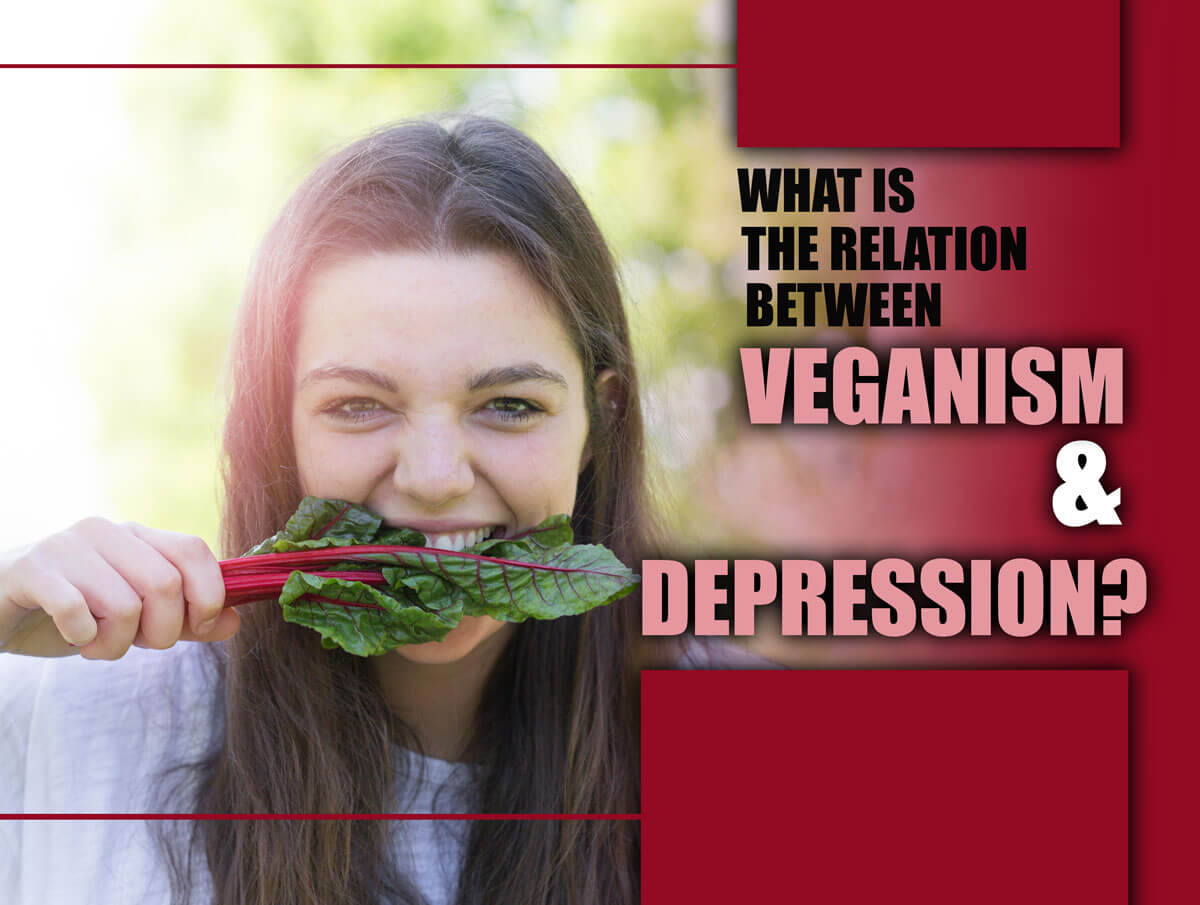
How to prevent depression & anxiety?
In this section, I wanna tell you some ways we can prevent depression and anxiety – because as someone who’s struggled with these conditions myself, I know just how tough they can be.
-
First things first, it’s important to prioritize self-care.
This might look different for everyone, but for me, it means making time for things like exercise, meditation, and journaling.
These practices help me feel more grounded and present in the moment, which can be a powerful antidote to feelings of depression and anxiety.
-
And of course, diet and lifestyle play a big role too.
As I told you about veganism and depression before, eating a plant-based diet rich in fruits, veggies, and whole grains can provide our bodies with the nutrients they need to function at their best, while avoiding things like processed foods and added sugars can help reduce inflammation and support brain health.
Ultimately, there’s no one-size-fits-all solution when it comes to preventing depression and anxiety. But, one of the most practical ways for preventing it, is to change your diet!
-
Balancing Macronutrients and Essential Nutrients:
When adopting a vegan diet, it’s essential to ensure you’re getting a balanced intake of macronutrients (carbohydrates, proteins, and fats) to support your mental health. Add whole grains, legumes, nuts, and seeds to your meals to meet your protein needs. Don’t forget to load up on colorful fruits and veggies for a wide range of vitamins, minerals, and antioxidants. Consider consulting a registered dietitian to create a personalized meal plan that covers all your nutrient requirements.
-
Plant-Based Sources of Omega-3 Fatty Acids:
Omega-3 fatty acids are vital for brain health; luckily, you can find vegan-friendly sources to meet your needs. Include foods such as chia seeds, flaxseeds, hemp seeds, walnuts, and algae-based supplements rich in omega-3s. These healthy fats help reduce inflammation and support optimal brain function, positively impacting your mood and mental well-being.
-
Vegan Alternatives for Mental Well-Being:
Contrary to popular belief, going vegan doesn’t mean giving up on your favorite flavors and textures. Thanks to the growing popularity of veganism, there’s an abundance of plant-based alternatives that promote mental well-being. Explore delicious meat alternatives from soy, tempeh, seitan, or legumes. These options provide the satisfaction you crave while being free from cholesterol and low in saturated fat. Additionally, dairy-free milk, cheese, and ice cream alternatives made from nuts, oats, or soy can fulfill your cravings without compromising your mental health goals.
-
Seek Professional Guidance and Support:
Transitioning to a vegan lifestyle can initially feel overwhelming, but remember, you don’t have to do it alone! Seeking professional guidance from a registered dietitian or nutritionist specializing in plant-based diets can be immensely helpful. They can provide personalized advice, ensure you’re meeting your nutritional needs, and address any concerns or questions you may have along the way. Connect with vegan communities, online forums, and social media groups to find support, share experiences, and discover new recipes and resources.
Whether it’s through therapy, support groups, or just spending time with loved ones, having a strong support system can make a huge difference in our mental health.
Don’t be afraid to reach out for help if you need it – there’s no shame in asking for support.
Embracing a vegan lifestyle can genuinely transform your mental health and mood. By following these practical tips, you’ll be well on your way to reaping the benefits of a plant-based diet while nourishing your body and mind.
Remember, going vegan is a compassionate choice for animals and the planet and a powerful step towards a healthier, happier you. So, let’s embark on this journey together and experience its incredibly positive impact on our mental well-being.

Personal stories of vegans coping with depression & thriving on a plant-based diet
Hearing from others who have experienced similar challenges can be immensely encouraging and uplifting, especially as a vegan who has fought with depression personally.
One of the things I love about the vegan community is how supportive and open-minded we are.
I’ve connected with so many amazing people who have shared their stories of overcoming depression and thriving on a plant-based diet.
For example, I recently met a woman who had struggled with depression for years before going vegan.
She said that switching to a plant-based diet was a game-changer for her mental health – she felt more energized, focused, and emotionally stable than ever before.
Another friend of mine who’s been vegan for years told me that adopting a plant-based diet helped her overcome anxiety and depression.
She said that she feels more connected to the earth and other living beings, which brings her a sense of peace and purpose.
These personal stories are just a few examples of the many ways that veganism and mental health are connected.
While everyone’s journey is different, I truly believe that a plant-based diet can be a powerful tool in managing depression and promoting overall well-being.
So, my friends, keep supporting each other and keep thriving on your plant-based journeys.
We’re all in this together, and together we can make a positive impact on ourselves, our communities, and the world around us.
To sum up
I hope this article has shed some light on the powerful connections between veganism and mental health. It’s incredible how the food we eat can have such a profound impact on our well-being.
If you’re new to plant-based eating, don’t worry – plenty of delicious and satisfying options are out there!
Experiment with different fruits and veggies, try out new plant-based proteins like tofu or tempeh and don’t be afraid to get creative in the kitchen. This can help you to protect yourself mentally!
What steps can you take to prioritize your mental health and well-being starting today?
Whether trying out some plant-based recipes, reaching out to a friend, or taking time for yourself, small changes can add to big results.
Now, I’d love to hear from you! Have you personally experienced improvements in your mental health since embracing a vegan lifestyle? Do you have some tips or favorite plant-based recipes to share? Whatever your thoughts, experiences, or opinions, please leave them in the comments below. Let’s create a space to learn from and support each other on our vegan and mental health journeys.
Remember, you are not alone in this. By sharing our stories and knowledge, we can inspire and empower one another to lead happier, healthier lives. So, don’t be shy—let’s start the conversation!
Wishing you love, compassion, and vibrant mental health on your vegan journey. Keep shining bright!


